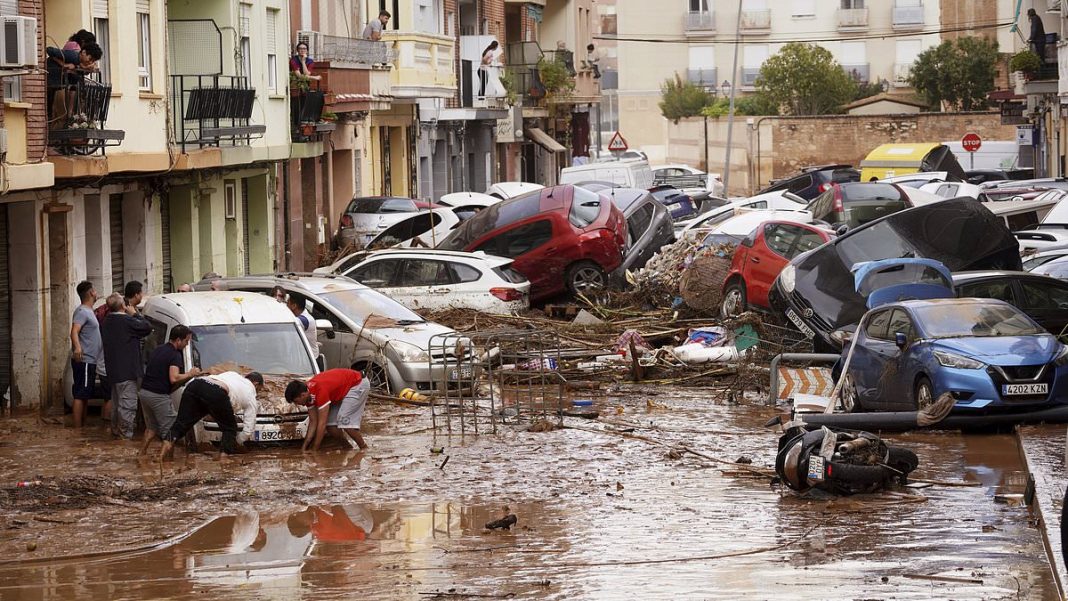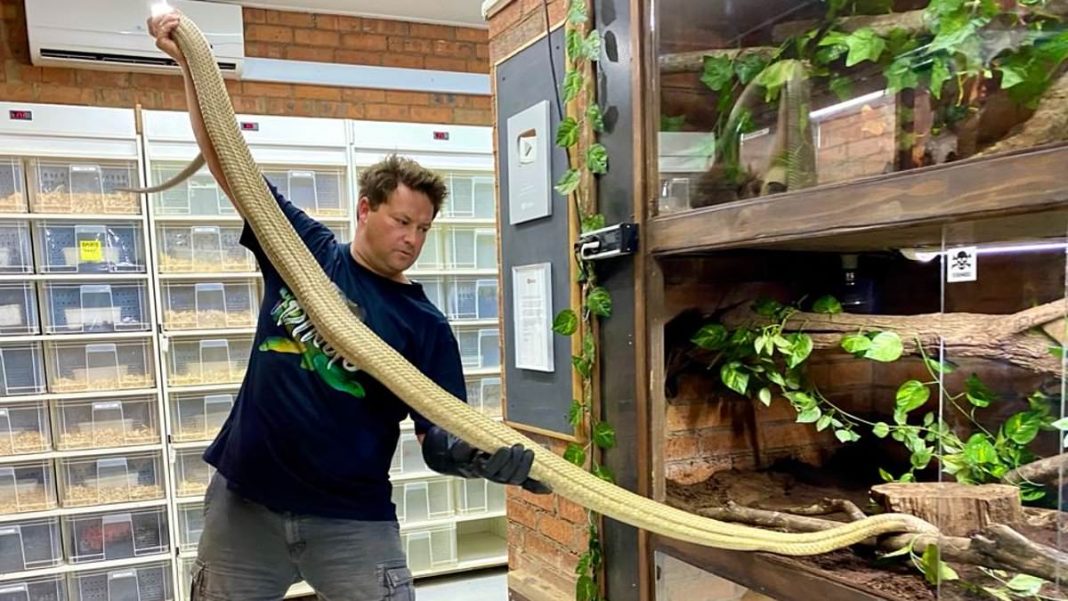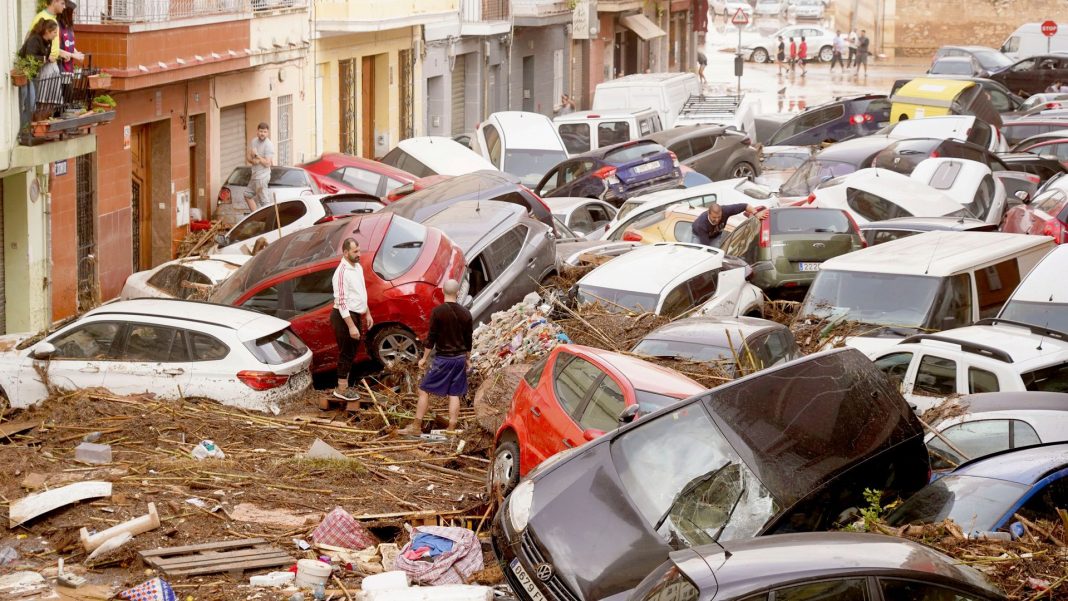Scientists blame climate change for Valenica’s flooding,
Spain is in the midst of one of its worst-ever natural disasters, with horrendous flash floods sweeping large parts of the country.
The floods turned streets in Valencia into rivers and left hundreds trapped in their homes, with many even forced to climb trees, scale lampposts and sprint desperately to the upper floors of buildings to escape.
Now, scientists say that this catastrophic event was fuelled by climate change.
Dr Friederike Otto, Lead of World Weather Attribution at the Centre for Environmental Policy, Imperial College London, said: ‘No doubt about it, these explosive downpours were intensified by climate change.
‘With every fraction of a degree of fossil fuel warming, the atmosphere can hold more moisture, leading to heavier bursts of rainfall.
‘These deadly floods are yet another reminder of how dangerous climate change has already become at just 1.3°C of warming.
‘But last week the UN warned that we are on track to experience up to 3.1°C of warming by the end of the century.’
Dr Jess Neumann, Associate Professor of Hydrology at the University of Reading, added: ‘The flash floods in Spain are another terrible reminder of the changing and more chaotic weather we are experiencing as a result of climate change.’
Studies have shown that the Mediterranean region – which is home to more than 510 million people – is warming 20 per cent faster than the global average.
This leaves coastal zones at heightened disaster risks, including flooding and erosion.
Dr Ernesto Rodríguez Camino, Senior State Meteorologist and member of Spanish Meteorological Association, said: ‘In general terms, what we know is that, in the context of climate change, these types of intense and exceptional, rare rainfall events are going to become more frequent and more intense and, therefore, destructive.’
The UN Environment Programme calls the Mediterranean a ‘climate change hotspot’ where vulnerabilities are exacerbated.
‘Water temperature is expected to rise by between 1.8°C and 3.5°C by 2100 with hotspots in Spain and in the Eastern Mediterranean,’ the UN explains.
Worryingly, it’s not just increased rainfall we have to worry about.
Professor Mark Smith, Professor of Water Science & Health at the University of Leeds, said: ‘As well as increased rainfall extremes, we are seeing hotter summer which can bake the soil and reduce its ability to absorb water.
‘In turn this amplifies the more direct effects of increased rainfall intensities as more of that water makes it into the rivers.
‘Flood warnings in this area have long been challenging.
‘Many streams and rivers are often dry for much of the year and a high proportion of annual rainfall can typically fall within a very short period.
‘When flash floods develop from intense rain, the flood wave can move through the river catchment with tremendous speed.
‘This has been the case for centuries, but with increased rainfall extremes, new areas are moving into zones at risk.
The UN predicts that, outside of summer, the Mediterranean will see up to 20 per cent more rainfall events by 2080.
‘Events of this type, which used to occur many decades apart, are now becoming more frequent and their destructive capacity is greater,’ Dr Camino explained.
The expert said the full extent of the link between climate change and these latest floods remains unclear.
‘Associating a particular event like this to climate change, i.e. asking the question that if we had not had climate change we would have suffered an event like this, requires a posteriori studies and can always be said in probabilistic terms, but not on the fly,’ he added.
‘This is something that will be analysed and these very destructive or very violent cases, then give rise to many studies that are done in academic and research fields.
‘In the context of climate change, these types of events will be more frequent and more intense.’
Spain has experienced similar autumn storms in recent years, although nothing has even come close to comparing to the devastation over the last two days.
It is the worst flood-related catastrophe in Spain since 1996, when 87 people died and 180 were injured in a flash flood near Biesca in the Pyrenees.
Professor Liz Stephens, Professor in Climate Risks and Resilience at the University of Reading, said: ‘People shouldn’t be dying from these kinds of forecasted weather events in countries where they have the resources to do better.
‘While a red weather warning was issued for the region with sufficient time for people to move out of harm’s way, a red warning alone doesn’t communicate what the impact will be and what people should do.
‘Climate scientists have been warning for years that climate change will lead to more intense rainfall, and the tragic consequences of this event show that we have a long way to go to prepare for this kind of event, and worse, in future.’









